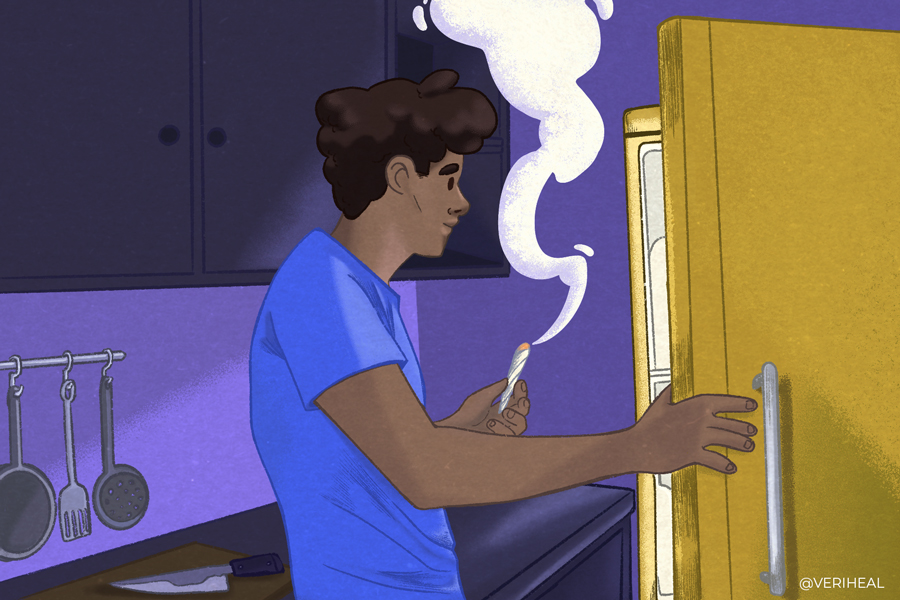What goes well with a blunt? A tray of snacks for afterward. My personal favorite snack to satisfy the munchies? Anything covered in chocolate. Munchies are a double-edged side effect of consuming a cannabinoid called tetrahydrocannabinol (THC) from cannabis.
Munchies are a feeling of hunger that one experiences after having consumed cannabis. It is just one of the many side effects that one can experience after consumption. It can make your body want to eat more, even if it’s not hungry.
How the Munchies Happen
The cannabinoids in cannabis react with the cannabinoid receptors that our bodies produce naturally and stimulate certain brain areas. Those endocannabinoid system areas include but are not limited to our memory, pain, and appetite.
Munchies are a byproduct of the stimulation of our appetite. The munchies can affect any person that consumes cannabis, and many welcome it. The reason we get munchies is simple: THC stimulates the part of your brain controlling your appetite. There is also evidence that displays how THC stimulates the ghrelin hormone, which makes you hungry. The food smells better, it tastes better, and you’ll want to eat all of it.
The ghrelin hormone is generally released when our stomachs are empty to tell our brain that it is time to eat. The consumption of cannabis has recently been suggested by lab mice research to trigger that same process: the generation of the hormone to send the brain an “I’m hungry” message.
This alone is enough to explain why we get the munchies. However, this was all recently discovered along with the fact that cannabis will not be able to stimulate appetite if the ghrelin or cannabinoid receptors are taken away. Research on the munchies is limited to these mice studies but originated with the study of how THC affects the brain. THC overpowers appetite-suppressant neurons and manipulates them to make you think you are hungry.
Another part of your brain, which the THC taps into to cause the munchies, is called the olfactory bulb. The olfactory bulb is the primary smell center in our brains. THC essentially charges the olfactory bulb through receptors in the brain. This means that your sense of smell will be enhanced while under the influence of cannabis, which is significant because hunger and smell both greatly influence our appetite.
Why You Should Get Your Medical Marijuana Card
Veriheal has satisfied millions of patients nationwide by giving them access to these benefits
- Larger purchase limits
- Peace of mind
- Enhanced legal protection
- Access to higher potency strains
- Save up to 25% on cannabis purchases
- Skip the line at the dispensary
Our biological structure ensures that when we are (or think we are) hungry, our olfactory bulb enhances our sense of smell in order to start priming the digestive process. A sharp or enhanced sense of smell means that we are more likely to seek out food.
The Munchies Can Speed Up Metabolism
The idea of eating a lot when you may not actually be hungry may be a scary concept for many. However, cannabis-related increases in appetite (the munchies) should be acknowledged and, if necessary, embraced and used to their full potential. Here’s why you should embrace the munchies too.
Cannabis can speed up your metabolism. A very large 2020 study shows that cannabis consumers, as a population, are slimmer and have a lesser rate of obesity and diabetes than those who don’t consume it. I have personally experienced an increase in appetite while getting slimmer since I started regularly consuming cannabis.
Regular cannabis consumers may eat around 600 more calories than the average person while losing weight (best case) or not picking up any weight at all. The healthier the food you snack on, the higher your chances of weight loss. Studies suggest that cannabis can also increase the amount of energy that you spend, which means that you need to fuel your body with more food for more energy. Luckily for you, the munchies are there to help.
In short, THC starts a ghrelin hormone surge, activates neurons to make you think you are hungry, and boosts your sense of smell, which all contribute to giving you the munchies. The increase in metabolism is yet another fortunate side-effect of cannabis consumption.
This benefit is also significant when illnesses involve digestion and appetite. The stimulation of appetite from THC may help deal with potential weight loss, although clinical studies have yet to prove weight gain in humans with conditions other than HIV/AIDS. Cannabinoids like THC, CBG, and CBN are also promising candidates for dealing with illnesses that involve appetite loss, which reduces the quality of life.
If you feel like the munchies are a problem for you, however, check out this article for some tips: How to Stop the Munchies After Getting High
Author, Share & Comments
















